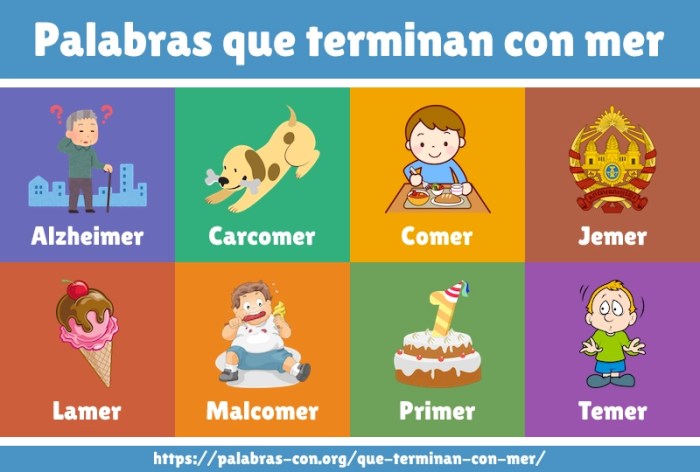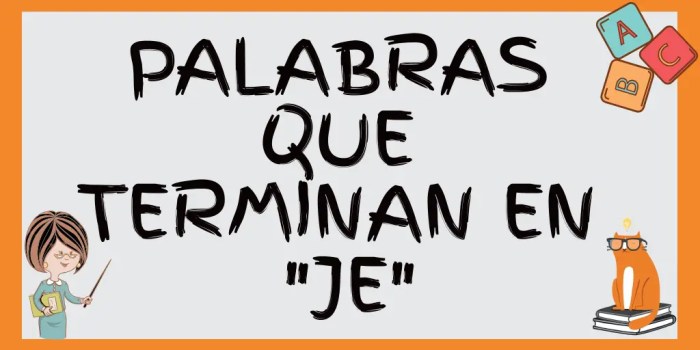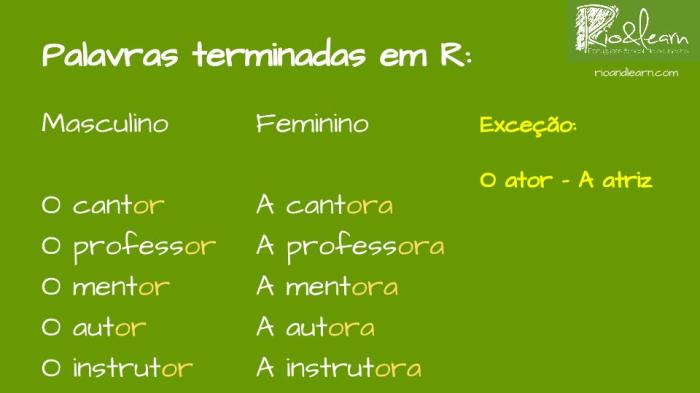Las palabras que terminan en oe ocupan un lugar central en el idioma español, aportando un matiz único a la comunicación. Estas palabras, que se caracterizan por su terminación distintiva, juegan un papel vital en la gramática, la pronunciación y la cultura españolas.
A lo largo de este artículo, nos sumergiremos en el fascinante mundo de las palabras que terminan en oe, explorando su significado, uso, pronunciación, evolución histórica y relevancia cultural. Nos adentraremos en las complejidades de este fenómeno lingüístico, descubriendo su singularidad y su importancia en el tejido del idioma español.
Definition and Overview

In Spanish, “palabras que terminan en oe” refers to words that end with the letter combination “oe.” These words are typically nouns and adjectives, and they have a specific grammatical significance in the language.
One of the most common examples of “palabras que terminan en oe” is the word “poe,” which means “poem.” Other common examples include “roe,” which means “knee,” and “voe,” which means “voice.”
Grammatical Significance
The letter combination “oe” in Spanish is often used to indicate that a word is masculine in gender. This is because the vast majority of Spanish nouns that end in “oe” are masculine. For example, the word “poe” (poem) is masculine, as is the word “roe” (knee).
However, there are a few exceptions to this rule. For example, the word “voe” (voice) is feminine. This is because it is a feminine noun that refers to a female singer.
Usage and Examples
Palabras que terminan en “oe” son comunes en español y se utilizan en varios contextos gramaticales. Pueden funcionar como sustantivos, verbos, adjetivos o adverbios, aportando diversidad y riqueza al idioma.
A continuación, se presenta una tabla que muestra ejemplos de palabras que terminan en “oe” en diferentes categorías gramaticales:
| Categoría | Palabra | Ejemplo |
|---|---|---|
| Sustantivo | Azúcar | El café necesita azúcar para endulzarlo. |
| Verbo | Rodeo | Rodeé la manzana varias veces antes de encontrar la casa. |
| Adjetivo | Rojo | El vestido rojo resaltaba entre los demás. |
| Adverbio | También | También iré al cine, aunque no me guste mucho la película. |
Pronunciation and Spelling

Palabras que terminan en oe have a unique pronunciation and spelling that sets them apart from other Spanish words.
When pronouncing words ending in “oe,” the “o” is pronounced as a closed “o” sound, similar to the “o” in the English word “boat.” The “e” is pronounced as a silent letter.
Palabras que terminan en “oe” son comunes en español, como “aloe” y “aloe vera”. Incluso hay un cuento popular birmano sobre “the black rabbit of inlé” ( the black rabbit of inlé ) que tiene un final inesperado. Volviendo a las palabras que terminan en “oe”, estas a menudo tienen un sonido suave y agradable.
Spelling Rules
There are several spelling rules associated with words ending in “oe”:
- Most words ending in “oe” are derived from Greek roots.
- The “oe” spelling is typically used when the word is derived from a Greek word that has an “οι” diphthong.
- In some cases, the “oe” spelling is used to differentiate between words with similar pronunciations but different meanings.
Historical Evolution

The historical evolution of “palabras que terminan en oe” in Spanish is a fascinating journey that spans centuries. These words have undergone significant changes in usage and pronunciation, reflecting the dynamic nature of the Spanish language.
In the early stages of the language’s development, words ending in “-oe” were much more common. They were often used in place of modern words ending in “-o” or “-ue”. For example, the word “roe” (knee) was once spelled “rooe”.
Pronunciation Shift
Over time, the pronunciation of these words began to change. The “-oe” ending gradually shifted to a more “o” sound, and eventually, many words lost the “e” altogether. This change is evident in the modern pronunciation of words like “roe” (now pronounced “ro”) and “fuego” (fire), which was once spelled “fuegoe”.
Usage Decline
Along with the pronunciation shift, the usage of words ending in “-oe” also declined. Many of these words were replaced by more modern forms, and today, they are relatively rare in everyday speech.
Cultural and Literary Significance

Palabras que terminan en -oe” hold a significant place in Spanish-speaking cultures, with a rich history and usage in literature, music, and other artistic expressions.
These words evoke a sense of nostalgia, elegance, and poetic beauty, adding a touch of sophistication to both written and spoken language.
In Literature
In literature, “palabras que terminan en -oe” are often used to create a sense of timelessness and evoke a bygone era. They appear in both classic and contemporary works, adding a touch of formality and grandeur to the narrative.
- In Miguel de Cervantes’s “Don Quixote,” the character of Dulcinea del Toboso is often referred to as “mi señora Dulcinea del Toboso,” emphasizing her beauty and unattainable status.
- In Federico García Lorca’s poem “Romance de la luna, luna,” the repetition of “cae” and “roe” creates a haunting and melancholic atmosphere.
In Music
In music, “palabras que terminan en -oe” are commonly found in traditional folk songs and ballads, where they contribute to the lyrical beauty and emotional depth of the lyrics.
- In the Mexican folk song “La Llorona,” the refrain “Ay, de mi madre, yo soy huérfano” expresses the orphan’s grief and longing.
- In the Argentine tango “Por una cabeza,” the lyrics “Yo no sé qué tiene el tango / Que conmueve tanto” highlight the evocative power of the dance.
Comparison with Other Languages: Palabras Que Terminan En Oe
Spanish words ending in “oe” have unique characteristics that distinguish them from similar words or grammatical constructions in other languages. While some languages may have words that share similar sounds or spellings, the specific usage and grammatical rules governing “palabras que terminan en oe” in Spanish set them apart.
French, Palabras que terminan en oe
In French, words ending in “oe” typically indicate a masculine noun or adjective, such as “le héros” (the hero) or “le nœud” (the knot). However, these words are pronounced differently from their Spanish counterparts, with a more open “o” sound and a silent “e.”
Additionally, French does not have a specific grammatical rule for the use of “oe” endings, unlike Spanish, where it is associated with specific verb conjugations and noun forms.
Italian
Italian also has words ending in “oe,” but they are less common and often indicate a diphthong sound, where two vowel sounds are combined into one syllable. For example, the word “poeta” (poet) is pronounced with a diphthong that combines the “o” and “e” sounds.
In Spanish, “oe” endings do not typically indicate a diphthong, but rather a separate syllable with a distinct “o” and “e” sound.
Portuguese
Portuguese, like Spanish, has a significant number of words ending in “oe.” However, in Portuguese, these words are pronounced with a closed “o” sound, similar to the “o” in English “go.” Additionally, Portuguese uses “oe” endings in a wider variety of contexts, including verb conjugations, nouns, and adjectives.
FAQ Insights
¿Qué son las palabras que terminan en oe?
Las palabras que terminan en oe son palabras en español que tienen la terminación “-oe”. Estas palabras pueden ser sustantivos, verbos, adjetivos o adverbios.
¿Cuáles son algunos ejemplos de palabras que terminan en oe?
Algunos ejemplos de palabras que terminan en oe incluyen “aloe”, “canoe”, “chocolate” y “roe”.
¿Cómo se pronuncian las palabras que terminan en oe?
Las palabras que terminan en oe se pronuncian con un sonido “o” cerrado, como en la palabra “cone”.